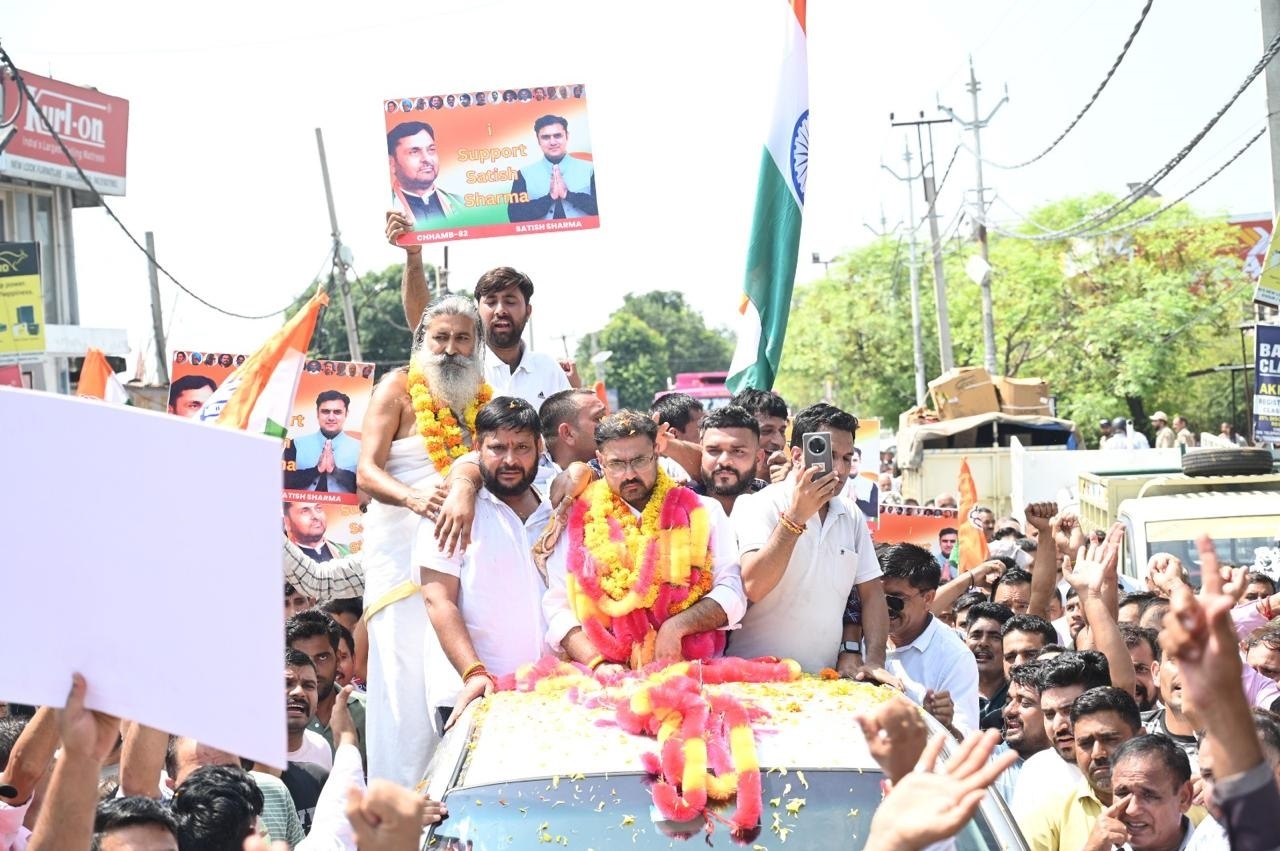Bhalla Chosen RS Pura South Jammu assembly constituency, Toni Fielded in Bahu
Avinash Azad
As the Jammu and Kashmir Assembly elections inch closer, both the Congress and the Bharatiya Janata Party (BJP) are grappling with deep internal strife over candidate selection, threatening their strategies and political futures in the region.
The confusion and discontent have surfaced prominently with the filing of nomination papers as independent candidate by Congress leader Satish Sharma, challenging his own party’s official candidate, veteran politician Tara Chand, from the Chamb constituency.
Satish Sharma, son of the late Madan Lal Sharma, a former minister, MLA, and MP, has a significant political legacy in the Chamb region. His loyal service and deep roots within the Congress made him a formidable contender for the seat.
However, the Congress high command’s decision to field Tara Chand, who served as the Deputy Chief Minister in the 2008-2014 Omar Abdullah government, has sparked outrage within party ranks. Tara Chand had previously deserted the Congress to join Ghulam Nabi Azad’s Democratic Progressive Azad Party (DPAP), only to return when his political prospects dimmed in the new party. His re-entry into Congress and immediate preference for a ticket over Sharma has caused resentment and exposed fractures within the party’s leadership.
The Chamb seat, which was previously reserved, has now been unreserved following delimitation. It was widely anticipated that Satish Sharma, given his family legacy and personal political work, would be handed the ticket, but the choice of Tara Chand has left many questioning the party’s judgment.
A senior Congress leader voiced this discontent: “Satish Sharma stood by the Congress through thick and thin, even when many leaders, including his uncle Sham Lal Sharma, shifted to the BJP. Rewarding Tara Chand, who abandoned the party during critical moments, is a questionable decision. This move alienates loyalists like Satish Sharma.”
This internal discord in Congress mirrors the struggles within the BJP, though the saffron party’s well-established position in Jammu and Kashmir makes it better equipped to manage dissent. The BJP, known for its disciplined cadre and organized structure, is also facing challenges over ticket distribution across key constituencies. However, given its current political dominance in the region, BJP’s internal conflicts may not pose as significant a threat to its electoral prospects as Congress’s ongoing leadership crisis.
One of the key concerns for Congress is its vulnerability after being out of power in Jammu and Kashmir for over a decade. The party’s decision-making has increasingly come under scrutiny, with many feeling that decisions are being made without consulting local leadership or considering the ground realities.
The party’s move to field T.S. Toni from the newly delimited Bahu constituency has raised eyebrows, especially as it bypassed former MLA Raman Bhalla. Bhalla, a two-time winner from the former Gandhi Nagar constituency, was a natural choice for Bahu. Instead, he has been fielded from the RS Pura South Jammu constituency, considered a safer seat. However, this choice has baffled many in the party, who fear alienating Bhalla’s voter base in Bahu.
A senior Congress insider revealed: “Bhalla has always had a strong voter base in what is now Bahu. He is one of the few leaders who could have won the seat, but the party high command’s decision to sideline him could backfire. This is an internal issue that should have been resolved through discussions with local leaders.”
This decision reflects a larger problem within the Congress, where candidate selection appears to be driven by the central leadership with little regard for local realities. In contrast, the BJP, though facing similar internal challenges, benefits from a stronger top-down approach, where disputes are contained or managed more efficiently.
As both national parties contend with these internal challenges, the stakes in the upcoming Jammu and Kashmir Assembly elections are particularly high. For Congress, the Chamb decision could be pivotal. With Satish Sharma’s rebellion and Tara Chand’s return, the party risks losing a key seat. Similarly, the fielding of T.S. Toni, a DDC, who won against BJP candidate, could have perform well in RS Pura seat, but in Bahu it is quite difficult to bring masses together.
Meanwhile, the BJP, though more resilient, also faces its own hurdles in navigating candidate selections in multiple constituencies. However, its organizational strength and dominance in the region might allow it to overcome these challenges more easily compared to the Congress, which is fighting for survival after a decade out of power.
The upcoming elections will be a litmus test for both parties, particularly for the Congress, which risks further marginalization if it cannot manage internal conflicts and restore confidence among its leaders and workers.
With candidates like Tara Chand and T.S. Toni fielded in contentious constituencies, Congress’s strategy appears fraught with risks that could either divide the party further or, in the worst-case scenario, cost it dearly at the polls. As the election draws near, all eyes will be on how these internal battles play out and whether Congress can recover in time to mount a serious challenge to the BJP in Jammu and Kashmir’s pivotal electoral contest.






